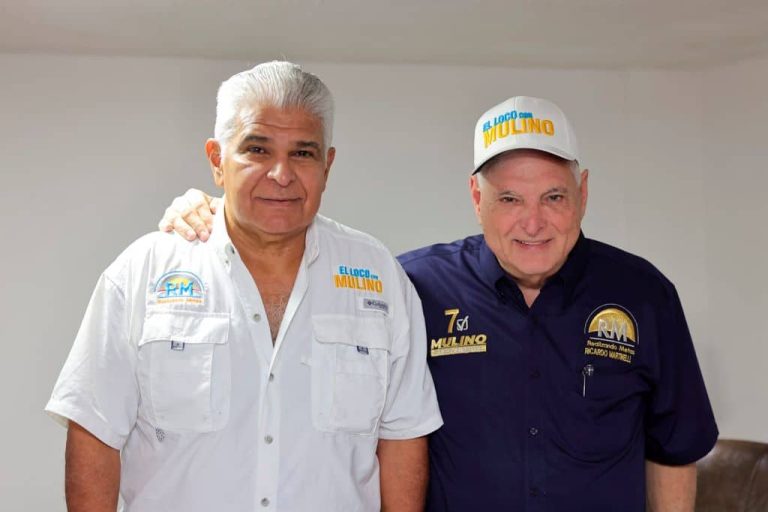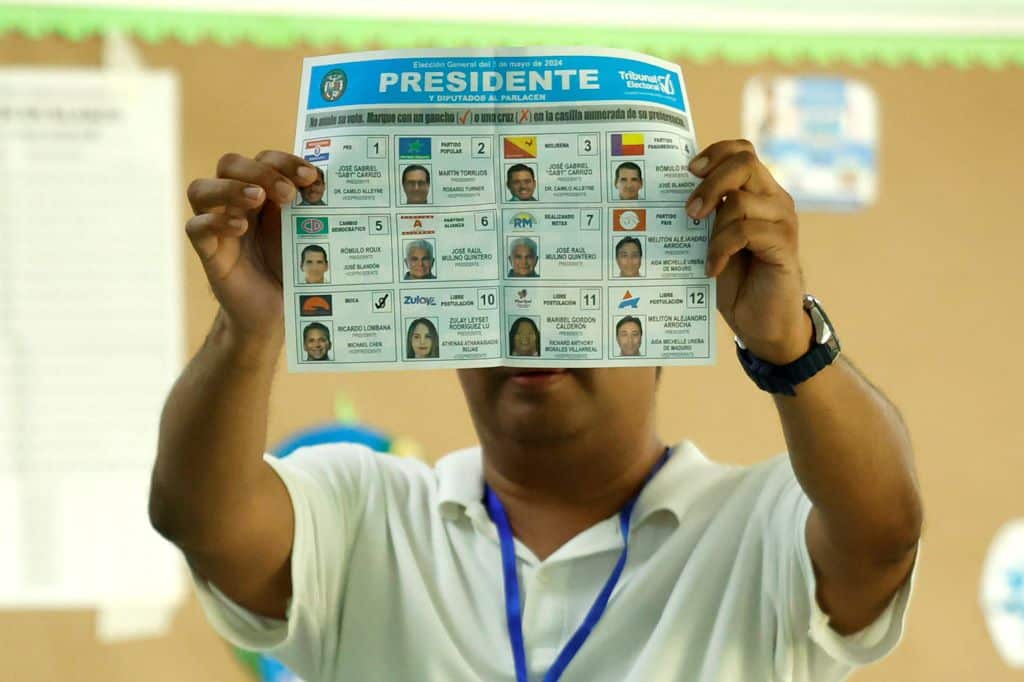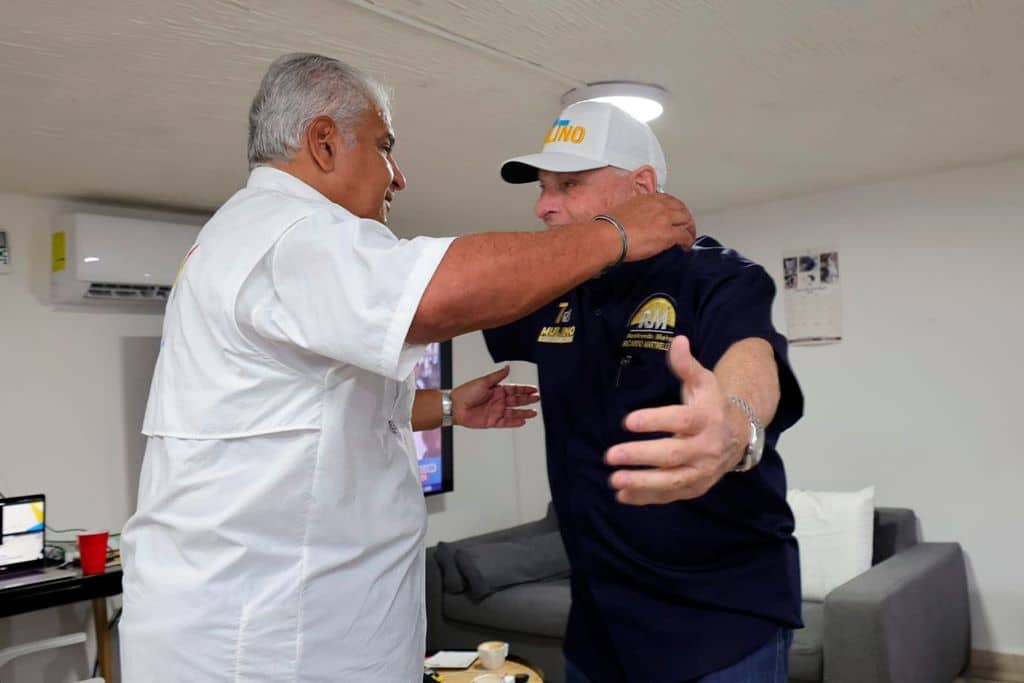6 de mayo 2024

Children of Exile: The Births “Sowing Hope” in the Camp of Nicaraguan Farmers

PUBLICIDAD 1M
PUBLICIDAD 4D
PUBLICIDAD 5D
Jose Mulino replaced former President Ricardo Martinelli, who has asylum in the Nicaraguan Embassy after being convicted of corruption

Jose Raul Mulino (left) poses next to former President Ricardo Martinelli, who has asylum at the Nicaraguan Embassy in Panama. Photo: EFE
Jose Raul Mulino, the protégé of the former president Ricardo Martinelli, disqualified due to corruption, was elected the new president of Panama on Sunday. He won by a wide margin over his seven competitors, who saw their votes split among themselves while the candidate who promised to put money back into Panamanians’ pockets triumphed.
With 98.53% of the votes counted Mulino captured 34.33% enough to take the presidency since there is no runoff election in Panama. Ricardo Lombana placed second with 24.76%, Martin Trujillos 16.02%, Romulo Roux 11.30%, Zulay Leyset Rodríguez 6.45%, Jose Gabriel Carrizo 5.83%, Maribel Gordon Calderon 1.07% and Meliton Alejandro Arrocha 0.21%.
“It is my pleasure, on behalf of the Electoral Tribunal, to inform you that according to our unofficial results transmission system, you are now the unofficial winner of the presidency of the Republic in the 2024 general elections,” Electoral Tribunal president Alfredo Junca told Mulino in a video call.
The former Security Minister responded that he received “the results with pleasure,” a decision of the Panamanian people which he accepts “with great responsibility and humility,” after a “very difficult” campaign full of obstacles, in which an attempt was made to “boycott” a “legally established party from having a candidate for the presidency.”
All of the losing candidates recognized their defeat, the last being Lombana, who was running as the major anti-corruption candidate, a term attributed to the figure of former President Ricardo Martinelli (2009-2014), and by extension, his ally Jose Raul Mulino.
Just over three million Panamanians were called to the polls to elect the new president and vice president, 20 deputies to the Central American Parliament (Parlacen), 71 deputies to the National Assembly, 81 mayors, 701 township representatives, and 11 councilors, all with their alternates, for the constitutional period from July 1, 2024, to June 30, 2029. The voter turnout was 77.63%.

The election day proceeded calmly, with no serious incidents reported, as presidential candidates urged voters to go to the polls.
EFE verified high participation in visits to schools, with voting tables crowded with voters who were generally able to vote with little problem.
The head of the Electoral Observation Mission from the Organization of American States (OAS), Argentine former Foreign Minister Susana Malcorra, spoke of a “very active” participation by voters, who approached the polls “with great enthusiasm, with a lot of joy,” and of a process that unfolded “within reasonableness and normalcy.”
The Electoral Tribunal noted that participation in these elections was higher than the 73% recorded in 2019.
The contentiousness among supporters of various parties showed itself on Sunday, with cheers for and against the candidates, and occasional scuffles outside the polling stations.
At Atlapa, the country’s largest voting center with just over 25,000 registered voters, supporters of Mulino and Lombana engaged in a verbal fight. Martinelli’s protégé received cheers of triumph from his followers, while his detractors chanted, “you won’t,” a slogan from the youth against traditional politics.
Some of the irregularities reported by political parties and the Electoral Tribunal focused mainly on attempts to take photographs of the vote —as evidence for alleged payment for voting a certain way—, the lack of one of the two necessary signatures from polling station representatives on the ballots to prevent the vote from being declared null, or engaging in electoral propaganda.
On March 5, Jose Raul Mulino officially became the presidential candidate for the Realizando Metas party after the Electoral Tribunal disqualified Martinelli as a presidential candidate after he was sentenced to over ten years in prison for money laundering.
The Tribunal ruled that on the ballot, in the box for Realizando Metas and the Alianza party, as his vice-presidential candidate, Mulino should replace Martinelli. This was contested before the Supreme Court, which just this week declared Mulino’s candidacy “constitutional.”
After voting, Jose Raul Mulino visited Ricardo Martinelli at the Nicaraguan Embassy in Panama City, where he sought refuge in February to avoid arrest, the guest of the Ortega government.
The president-elect met with the former president and limited himself to telling journalists that they had a “cappuccino” and exchanged a hug.
A little earlier, at a breakfast with journalists and when asked about Martinelli’s situation, who is accused in Panama of bribery in the Odebrecht scandal, in Spain for a similar case with the construction company FCC, and in 2023 was charged with corruption by the United States, Mulino simply replied: “Today is Election Day, friend; let’s vote and let’s win.”

Martinelli took to social media again on Sunday: “I thought this day would never come, or that I wouldn’t live to see it, due to the infamous, illegal, unjust, and inhumane political persecution I, my family, and many others have endured, including four attempts on my life,” Martinelli wrote on his X account.
Despite the political disqualification that came with an explicit ban on participating in the campaign, Martinelli continued with very active campaigning from the Nicaraguan Embassy.
This has led to numerous criticisms against the Electoral Tribunal, accused of not enforcing its own provision and allowing Martinelli’s presence in billboards, media, and social media.
It has also heightened diplomatic tension between Panama and Nicaragua due to the Panamanian government’s complaints, which have been completely ignored by the Ortega government, about the “permissiveness” given to the former president during his stay in the diplomatic delegation.
This article was published in Spanish in Confidencial and translated by Havana Times. To get the most relevant news from our English coverage delivered straight to your inbox, subscribe to The Dispatch.
PUBLICIDAD 3M
Agencia de noticias internacional con sede en Madrid, España. Fundada en Burgos durante la guerra civil española en enero de 1939.
PUBLICIDAD 3D